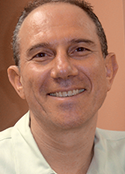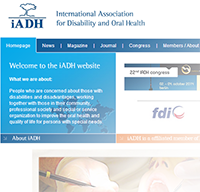 Dr. Clive Friedman
Dr. Clive Friedman
The International Association for Disability and Oral Health (iADH) recently developed an undergraduate curriculum document on special care dentistry, to support educators worldwide in providing dental students with the knowledge, skills and attitudes to effectively address the oral health needs of people requiring special care.
The guidance document—developed in collaboration with experts from 32 countries—outlines the most important aspects of an undergraduate curriculum in special care dentistry, divided into 6 domains of competency:
- the scope of special care dentistry
- access and barriers to oral health for people with disability and other marginalized groups
- consent for people requiring special care
- communication skills in special care dentistry
- impact of impairments, disabilities and systemic conditions on oral health and oral function
- clinical management of patients requiring special care dentistry
The iADH Education Committee hopes that dental faculties will include the guidance document within the confines of their current curriculum, focusing on particular domains according to their specific needs. “It is our belief that improving education will be the first step toward improving access to care for special needs patients,” explains Dr. Clive Friedman of London, Ontario, member of the Education Committee, iADH past-president and past-president of the iADH subgroup on special care dentistry for people with disability.
The next step for the committee is to develop case-based studies to be used as examples for teaching the different aspects of the curriculum. “The curriculum, as it is designed, does not require dental students to actually be able to provide the care, but they will be skilful oral health managers in knowing where to access that care and how to direct special needs patients to find the care they require,” notes Dr. Friedman.
The guidance document also reflects an important paradigm shift: the iADH bases its definition of special care on the World Health Organization’s International Classification of Functioning, Disability and Health rather than the International Classification of Diseases, resulting in closer attention to the social aspects of disease that may directly or indirectly affect oral health. “Depending on the service structure within a particular country, those requiring special care treatments may therefore include the underprivileged, the prison population or refugees, for example,” concludes Dr. Friedman.
To learn more about iADH activities and initiatives, visit http://www.iadh.org.
Listen to Dr. Friedman’s interview

